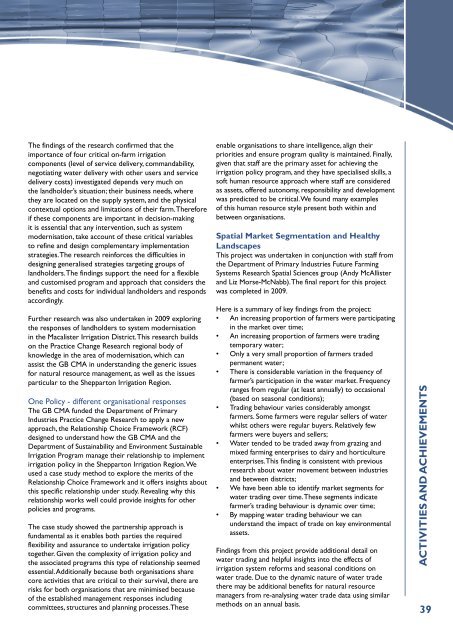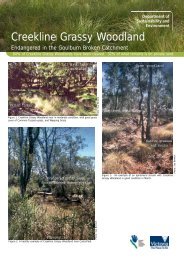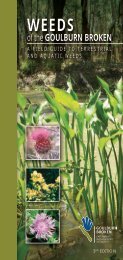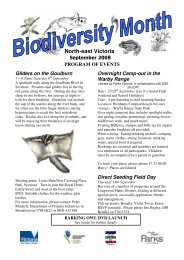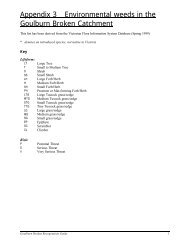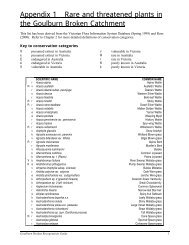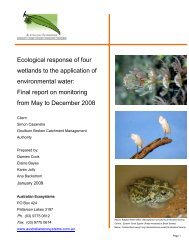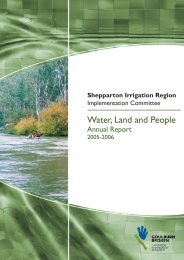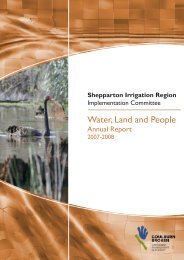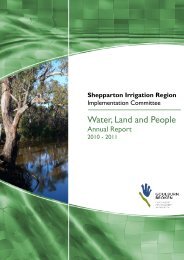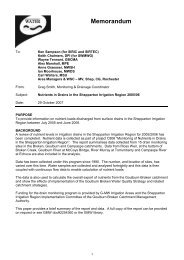Water, Land and People - Goulburn Broken Catchment ...
Water, Land and People - Goulburn Broken Catchment ...
Water, Land and People - Goulburn Broken Catchment ...
Create successful ePaper yourself
Turn your PDF publications into a flip-book with our unique Google optimized e-Paper software.
The findings of the research confirmed that the<br />
importance of four critical on-farm irrigation<br />
components (level of service delivery, comm<strong>and</strong>ability,<br />
negotiating water delivery with other users <strong>and</strong> service<br />
delivery costs) investigated depends very much on<br />
the l<strong>and</strong>holder’s situation; their business needs, where<br />
they are located on the supply system, <strong>and</strong> the physical<br />
contextual options <strong>and</strong> limitations of their farm. Therefore<br />
if these components are important in decision-making<br />
it is essential that any intervention, such as system<br />
modernisation, take account of these critical variables<br />
to refine <strong>and</strong> design complementary implementation<br />
strategies. The research reinforces the difficulties in<br />
designing generalised strategies targeting groups of<br />
l<strong>and</strong>holders. The findings support the need for a flexible<br />
<strong>and</strong> customised program <strong>and</strong> approach that considers the<br />
benefits <strong>and</strong> costs for individual l<strong>and</strong>holders <strong>and</strong> responds<br />
accordingly.<br />
Further research was also undertaken in 2009 exploring<br />
the responses of l<strong>and</strong>holders to system modernisation<br />
in the Macalister Irrigation District. This research builds<br />
on the Practice Change Research regional body of<br />
knowledge in the area of modernisation, which can<br />
assist the GB CMA in underst<strong>and</strong>ing the generic issues<br />
for natural resource management, as well as the issues<br />
particular to the Shepparton Irrigation Region.<br />
One Policy - different organisational responses<br />
The GB CMA funded the Department of Primary<br />
Industries Practice Change Research to apply a new<br />
approach, the Relationship Choice Framework (RCF)<br />
designed to underst<strong>and</strong> how the GB CMA <strong>and</strong> the<br />
Department of Sustainability <strong>and</strong> Environment Sustainable<br />
Irrigation Program manage their relationship to implement<br />
irrigation policy in the Shepparton Irrigation Region. We<br />
used a case study method to explore the merits of the<br />
Relationship Choice Framework <strong>and</strong> it offers insights about<br />
this specific relationship under study. Revealing why this<br />
relationship works well could provide insights for other<br />
policies <strong>and</strong> programs.<br />
The case study showed the partnership approach is<br />
fundamental as it enables both parties the required<br />
flexibility <strong>and</strong> assurance to undertake irrigation policy<br />
together. Given the complexity of irrigation policy <strong>and</strong><br />
the associated programs this type of relationship seemed<br />
essential. Additionally because both organisations share<br />
core activities that are critical to their survival, there are<br />
risks for both organisations that are minimised because<br />
of the established management responses including<br />
committees, structures <strong>and</strong> planning processes. These<br />
enable organisations to share intelligence, align their<br />
priorities <strong>and</strong> ensure program quality is maintained. Finally,<br />
given that staff are the primary asset for achieving the<br />
irrigation policy program, <strong>and</strong> they have specialised skills, a<br />
soft human resource approach where staff are considered<br />
as assets, offered autonomy, responsibility <strong>and</strong> development<br />
was predicted to be critical. We found many examples<br />
of this human resource style present both within <strong>and</strong><br />
between organisations.<br />
Spatial Market Segmentation <strong>and</strong> Healthy<br />
<strong>L<strong>and</strong></strong>scapes<br />
This project was undertaken in conjunction with staff from<br />
the Department of Primary Industries Future Farming<br />
Systems Research Spatial Sciences group (Andy McAllister<br />
<strong>and</strong> Liz Morse-McNabb). The final report for this project<br />
was completed in 2009.<br />
Here is a summary of key findings from the project:<br />
• An increasing proportion of farmers were participating<br />
in the market over time;<br />
• An increasing proportion of farmers were trading<br />
temporary water;<br />
• Only a very small proportion of farmers traded<br />
permanent water;<br />
• There is considerable variation in the frequency of<br />
farmer’s participation in the water market. Frequency<br />
ranges from regular (at least annually) to occasional<br />
(based on seasonal conditions);<br />
• Trading behaviour varies considerably amongst<br />
farmers. Some farmers were regular sellers of water<br />
whilst others were regular buyers. Relatively few<br />
farmers were buyers <strong>and</strong> sellers;<br />
• <strong>Water</strong> tended to be traded away from grazing <strong>and</strong><br />
mixed farming enterprises to dairy <strong>and</strong> horticulture<br />
enterprises. This finding is consistent with previous<br />
research about water movement between industries<br />
<strong>and</strong> between districts;<br />
• We have been able to identify market segments for<br />
water trading over time. These segments indicate<br />
farmer’s trading behaviour is dynamic over time;<br />
• By mapping water trading behaviour we can<br />
underst<strong>and</strong> the impact of trade on key environmental<br />
assets.<br />
Findings from this project provide additional detail on<br />
water trading <strong>and</strong> helpful insights into the effects of<br />
irrigation system reforms <strong>and</strong> seasonal conditions on<br />
water trade. Due to the dynamic nature of water trade<br />
there may be additional benefits for natural resource<br />
managers from re-analysing water trade data using similar<br />
methods on an annual basis.<br />
ACTIVITIES AND ACHIEVEMENTS<br />
39


